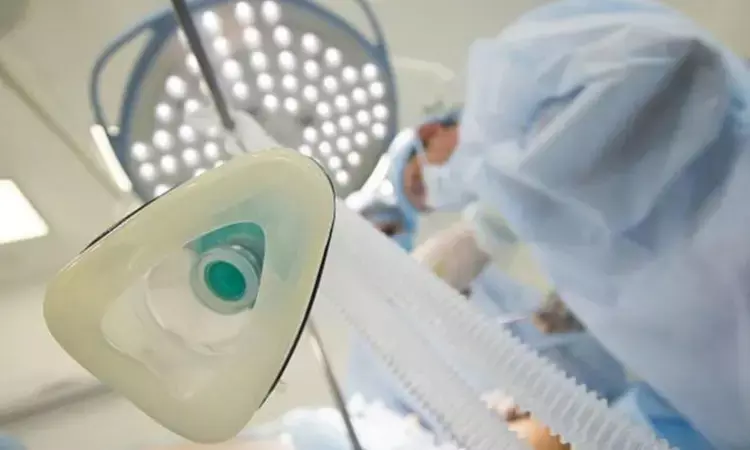- Home
- Medical news & Guidelines
- Anesthesiology
- Cardiology and CTVS
- Critical Care
- Dentistry
- Dermatology
- Diabetes and Endocrinology
- ENT
- Gastroenterology
- Medicine
- Nephrology
- Neurology
- Obstretics-Gynaecology
- Oncology
- Ophthalmology
- Orthopaedics
- Pediatrics-Neonatology
- Psychiatry
- Pulmonology
- Radiology
- Surgery
- Urology
- Laboratory Medicine
- Diet
- Nursing
- Paramedical
- Physiotherapy
- Health news
- Fact Check
- Bone Health Fact Check
- Brain Health Fact Check
- Cancer Related Fact Check
- Child Care Fact Check
- Dental and oral health fact check
- Diabetes and metabolic health fact check
- Diet and Nutrition Fact Check
- Eye and ENT Care Fact Check
- Fitness fact check
- Gut health fact check
- Heart health fact check
- Kidney health fact check
- Medical education fact check
- Men's health fact check
- Respiratory fact check
- Skin and hair care fact check
- Vaccine and Immunization fact check
- Women's health fact check
- AYUSH
- State News
- Andaman and Nicobar Islands
- Andhra Pradesh
- Arunachal Pradesh
- Assam
- Bihar
- Chandigarh
- Chattisgarh
- Dadra and Nagar Haveli
- Daman and Diu
- Delhi
- Goa
- Gujarat
- Haryana
- Himachal Pradesh
- Jammu & Kashmir
- Jharkhand
- Karnataka
- Kerala
- Ladakh
- Lakshadweep
- Madhya Pradesh
- Maharashtra
- Manipur
- Meghalaya
- Mizoram
- Nagaland
- Odisha
- Puducherry
- Punjab
- Rajasthan
- Sikkim
- Tamil Nadu
- Telangana
- Tripura
- Uttar Pradesh
- Uttrakhand
- West Bengal
- Medical Education
- Industry
Intravenous sedation useful for dental patients with severe dementia, finds Study

Researchers have recently found out that intravenous sedation for dental treatment in the elderly with severe dementia, needs a dose titration to about half the usual dose in Midazolam, as published in the Journal of Dental Sciences.
Patients with severe dementia require intravenous sedation during dental treatment. However, few reports have compared the outcomes of intravenous sedation management among sedatives. Intravenous sedation in the elderly with severe dementia undergoing dental treatment was evaluated retrospectively.
Therefore, Hitomi Nishizaki and colleagues from the Department of Critical Care Medicine and Dentistry, Graduate School of Dentistry, Kanagawa Dental University, Yokosuka, Japan conducted a retrospective cohort study of a Japanese population to analyze the effectiveness of intravenous sedation for dental treatment in elderly patients with severe dementia.
The authors obtained the patients' characteristics and type of dementia from medical records. Nineteen patients with severe dementia who underwent 62 instances of sedation were included. Midazolam (MID), dexmedetomidine (DEX), and propofol (PRO) were administered as sedatives. The systolic blood pressure (SBP), heart rate (HR), SpO2, bispectral index (BIS) values and complications were evaluated.
The following key findings were noted-
a. The sedation time and permission time to return home were significantly longer in DEX than in MID or PRO group.
b. Half the usual dose in MID and lower limits of the routine dose was effective in DEX and PRO.
c. HR was significantly lower in DEX group.
d. There were 3 cases with airway obstruction requiring nasopharyngeal airway and 4 cases of apnea when MID was administered.
e. Two cases of Cheyne-Stokes-like respiration when MID or DEX was administered.
f. SpO2 <94% was found in 22 cases (35%) irrespective of the sedative.
g. A patient with dementia with Lewy bodies had experienced hallucinations during the recovery period after sedation when MID or DEX was administered.
h. The BIS value of ≤80 was noted during complications.
Hence, it was concluded that "intravenous sedation for dental treatment in the elderly with severe dementia, needs a dose titration. All sedatives had respiratory-related complications which mandate close monitoring."
Dr. Nandita Mohan is a practicing pediatric dentist with more than 5 years of clinical work experience. Along with this, she is equally interested in keeping herself up to date about the latest developments in the field of medicine and dentistry which is the driving force for her to be in association with Medical Dialogues. She also has her name attached with many publications; both national and international. She has pursued her BDS from Rajiv Gandhi University of Health Sciences, Bangalore and later went to enter her dream specialty (MDS) in the Department of Pedodontics and Preventive Dentistry from Pt. B.D. Sharma University of Health Sciences. Through all the years of experience, her core interest in learning something new has never stopped. She can be contacted at editorial@medicaldialogues.in. Contact no. 011-43720751
Dr Kamal Kant Kohli-MBBS, DTCD- a chest specialist with more than 30 years of practice and a flair for writing clinical articles, Dr Kamal Kant Kohli joined Medical Dialogues as a Chief Editor of Medical News. Besides writing articles, as an editor, he proofreads and verifies all the medical content published on Medical Dialogues including those coming from journals, studies,medical conferences,guidelines etc. Email: drkohli@medicaldialogues.in. Contact no. 011-43720751


